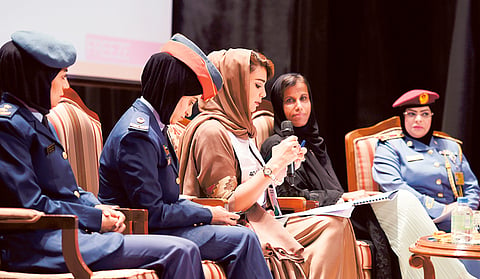Emirati women break glass ceiling
Emirati women make major gains in workplace in 30 years to earn equal rights, forum hears

Abu Dhabi: Emirati women have established themselves as a central part of the country’s workforce in just 30 years, whereas women in Europe spent up to three centuries striving to fight for their rights, a forum held at the General Women's Union heard.
Today, over 100,000 Emirati women make up UAE’s workforce and the country’s profits are expected to increase by 12 per cent if the UAE sees even greater participation from them, Fatima Al Shamsi, deputy vice chancellor for administration at Paris-Sorbonne University Abu Dhabi (PSUAD), said.
“However, while there are several women working for UAE’s diverse sectors, one can only hope to see an even stronger participation. Fifty per cent of UAE’s residents are women but only 25 to 32 per cent of them work.”
“Some of the reasons behind that could potentially be struggling to find a balance between work and family or even inequality in the workplace between different nationalities, particularly when it comes to promotions and salaries.”
Sometimes managers fail to comprehend that women may often have sudden family emergencies, which can be another contributing factor, she added.
Speaking on the sidelines of the forum to Gulf News, Major Amnah Al Beloushi, Chairperson of the Emirates Women Police Association, said: “I strongly believe that Emirati women were able to alter the global perception that fields such as the police or military are only for men. To me and to many, both men and women stand on an equal footing and can both achieve the same results.”
Another panellist, Latifa Mohammad Al Zaidi, a pilot in UAE’s armed forces, said: “Several Emirati women wonder how they could serve the UAE even though they don’t work in the military field.”
Instilling an appetite for shielding the country from any potential threats that may undermine its security and a passion for giving back to the nation is definitely an aspect that Emirati women can enforce as they continue to raise their children, she added.
The final panellist, Asma Al Mulla, who works for the National Service Authority, said that around 30 per cent of Emirati women serve the military and police sectors, which is testament to their capabilities.
Reem Al Falasi, Secretary-General of the Supreme Council for Motherhood and Childhood, also gave a speech on behalf of Her Highness Shaikha Fatima Bint Mubarak, Chairwoman of General Women’s Union, Supreme President of the Family Development Foundation and President of the Supreme Council for Motherhood and Childhood, about Emirati women’s paramount contributions to society.
Maisoon Mubarak is a trainee at Gulf News



